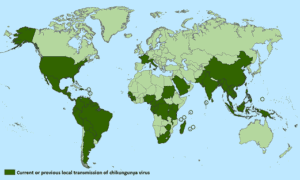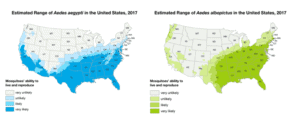While adventure travelers to sub-Saharan Africa have known for years about the intricacies of malaria prophylaxis or sleeping with a mosquito net, travelers to more tame locations now need to prepare for some of those same diseases. An increasing number of mosquito-borne illnesses common in developing regions of the world are cropping up in major metropolitan cities and tourist destinations. Diseases previously unheard-of in the western world are commanding the attention of health officials in Europe and the Americas, including:
- Malaria
- Chikungunya
- Zika
- Typhoid fever
- Yellow fever
- Dengue fever

In Italy, Southern France, and Gibraltar, the Asian tiger mosquito has been spreading chikungunya, a virus that causes fever, headache, and joint pain. Halfway through September, the World Health Organization (WHO) confirmed 14 locally-transmitted cases of chikungunya in Italy, six of which were reported in Rome. The Center for Disease Control and Prevention (CDC) reminds travelers that local transmission means mosquitos in the affected regions are carrying chikungunya—all the more alarming when considering a densely-populated city with visitors from around the world. To put this in greater context, Rome, one of the most popular tourist destinations in the world, boasts an average of 7-10 million visitors per year.
Malaria has also migrated beyond its traditional borders. While most commonly found in sub-Saharan Africa, the EU has seen a 20% increase in reported cases of malaria in the last two years. This summer, Greece reported at least five locally-transmitted cases, prompting the European CDC to issue a rapid risk assessment warning to travelers. An additional three cases of malaria were identified in British travelers returning from a resort on the island of Cyprus earlier this month.
In the Caribbean, Costa Rica has reported nine locally-acquired cases of malaria this year so far, after no local cases were reported between 2012 and 2015.

And here at home, the United States is bracing amid reports of new sightings of Aedes aegypti in counties in California and Nevada. Aedes aegypti spreads a variety of febrile viruses including yellow fever, dengue fever, chikungunya, and Zika.
With longer, hotter summers worldwide, mosquitos previously deterred by harsh winters are finding their way into new territory. In addition to climate change, technological and economic advancements continue to facilitate globalization and expedite movement across borders. These changes are allowing diseases once confined to more remote areas of the world to become serious threats to urban centers and tourist hubs.
As health professionals work to combat these emerging threats, travelers are urged to take strong precautions when visiting affected areas. Through its full-spectrum telemedicine offerings and a collaboration with the internationally-acclaimed Cleveland Clinic, VIGILINT affords individual travelers and organizations an unparalleled level of advisory expertise and security.
How we can help:
- GMAP – Our 24/7 joint telemedicine offering with Cleveland Clinic. From anywhere in the world, you can have a VIGILINT physician on the line within 30 seconds for personalized patient treatment.
- Corporate Medical Advisory Services – Our physicians and readiness experts provide corporate leadership with medical planning, direction, and recommendations that match the unique culture and circumstances of global and domestic organizations.
- Travel Medical Kits – Designed by emergency physicians, our individualized kits are based on personal medical history and include prescription medications, emergency medical supplies and around the clock access to VIGILINT physicians.
